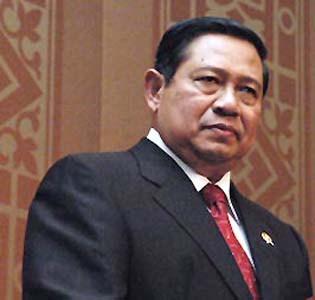Yudhoyono tipped to win, but recession Achilles' heel
 Jakarta - Indonesian President Susilo Bambang Yudhoyono looks poised for re-election this year in the absence of a credible challenger, but his popularity could wane as Indonesians begin to feel the effects of the global financial crisis, analysts said.
Jakarta - Indonesian President Susilo Bambang Yudhoyono looks poised for re-election this year in the absence of a credible challenger, but his popularity could wane as Indonesians begin to feel the effects of the global financial crisis, analysts said.
Opinion polls show Yudhoyono is a hands-on favourite in the July 8 presidential election, be the second time for a president to be directly elected by the people, with about 50 per cent of the vote.
Former president Megawati Sukarnoputri, daughter of Indonesia's founding president Sukarno, comes in a distant second.
Thirty-eight political parties will contest for seats in national, provincial and district legislatures on April 9, the third legislative elections since the fall of autocratic president Suharto in 1998.
Six local parties in Aceh province will compete with national parties for seats in provincial and district councils.
A party, or a coalition of parties, can nominate a candidate for the presidential election if it holds 20 per cent of the 560 seats in the House of Representatives or 25 per cent of the popular vote in the April elections.
A second round will be held in September if no presidential candidate wins a clear majority.
Recent polls indicated that Yudhoyono's Democratic Party would leap from fifth place in the 2004 elections to first, predicted to win about 24 per cent of the vote.
Yudhoyono's government has been credited with establishing peace in Aceh province after decades of separatist conflict and making good some of his 2004 campaign promises such as leading an aggressive campaign against corruption and maintaining economic stability.
"It will be hard for Megawati to beat Yudhoyono, unless her running mate is popular," said Rizal Sukma, an analyst at the Center for Strategic and International Studies in Jakarta.
But Rizal said Yudhoyono's popularity could be tested in May or June when Indonesians begin to feel the pinch of the global financial crisis.
"We don't know how much the global financial crisis will affect our economy and how many people will lose their jobs. The extent of its impact will influence people's views of the president's performance," he said.
Jobs, food prices, corruption eradication, education and healthcare are among key issues in a country where around half of its 237 million people live on less than 2 dollars a day.
Yudhoyono's popularity surged after he cut fuel prices twice in line with a slump in global oil prices. The former general had been forced to raise fuel costs earlier as global prices soared.
But critics say the president allows too much foreign involvement in the economy by privatizing state-owned companies.
Megawati, who has promised to lower prices of basic commodities if elected, has been nominated by the Indonesian Democratic Party of Struggle (PDI-P), the second largest party in parliament after the Golkar Party, Suharto's former political vehicle now led by Vice President Jusuf Kalla.
Megawati, known for being taciturn, lost the country's first direct presidential election in 2004 to Yudhoyono partly due to her perceived aloofness.
Megawati and Kalla held a closed-door meeting last month, sparking speculations that the two parties could team up against Yudhoyono.
Kalla and Yudhoyono are expected to go separate ways and the vice president has expressed readiness to run for the top job, but polls indicated he would get less than 5 per cent of the vote.
A Golkar-PDI-P alliance may force Yudhoyono, who has not picked a running mate, to rely on small Islamic parties for support, unless his party wins big enough vote to nominate him for the presidency without forming a coalition.
The Muslim-based Justice and Prosperity Party (PKS) is a member of Yudhoyono's ruling coalition and expected to improve its voter share from now 7 per cent thanks to its strong anti-corruption stance.
Prabowo Subianto, a former commander of the army special forces, whose military career was cut short after he was implicated in the kidnapping of pro-democracy activists in the dying days of Suharto's rule, is considered by many a dark horse.
Prabowo, backed by his businessman brother Hashim Djojohadikusumo, has mounted populist television advertisements depicting his Great Indonesia Movement Party (Gerindra) as a champion of farmers and the poor.
Another former general with presidential ambitions is Wiranto, an armed forces chief under Suharto, who has founded the People's Conscience Party.
"SBY is likely to be re-elected because his main opponents are old faces whose economic approaches will not be much different from the past," said Latif Adam, an economist at the National Institute of Sciences, using Yudhoyono's popular initials.
"But Yudhoyono's popularity will depend on how the government deals with the impact of the global economic turmoil, though I expect election-related activities will cushion its impact a bit on the poor," Latif said. For many poor Indonesians, elections mean free T-shirts and taking part in campaign rallies where food and cash are handed out.
Many voters have their minds made up about who they will support for president, but unsure whether to vote in the legislative elections, citing unfamiliarity with the candidates and their programmes.
Polls suggest about 20 per cent of voters remain undecided.
"I'm just a supporter of our current president, that's why I'd like him to stay on," said Johannes Mantiri, who works for a business consulting company.
"There are a lot of posters with candidates for the legislative elections, but I have no idea about the background of any of those people," he said. (dpa)